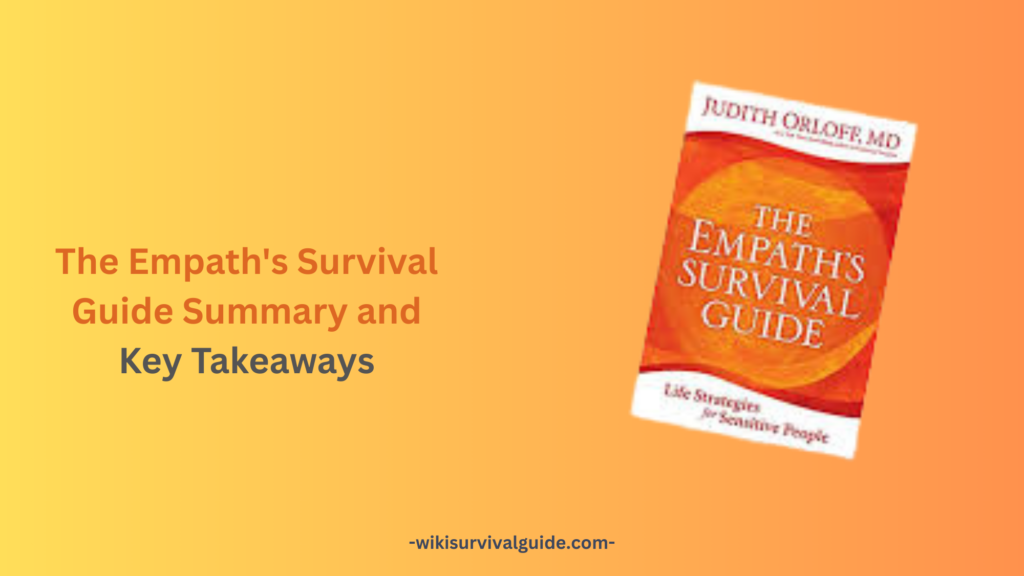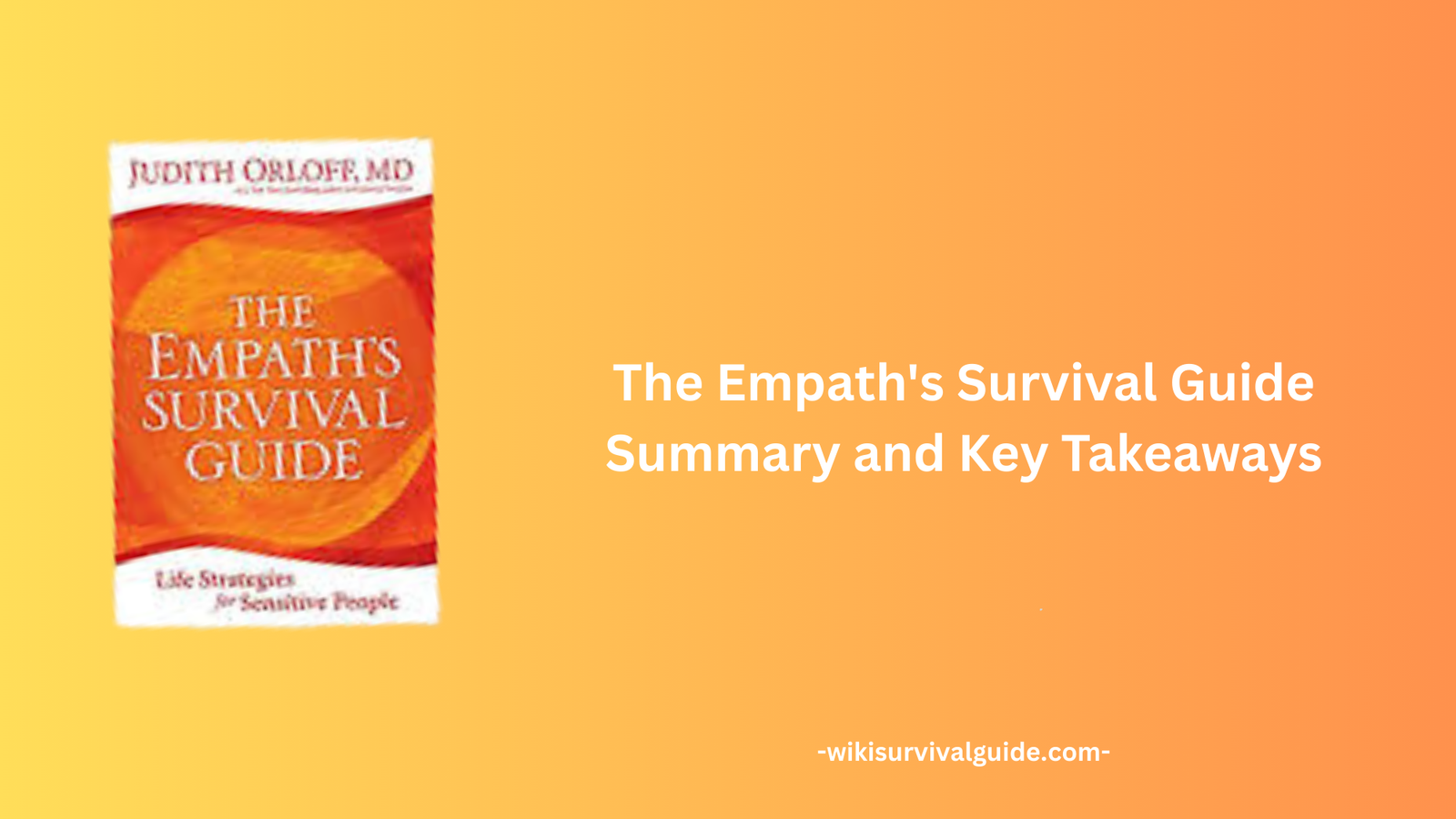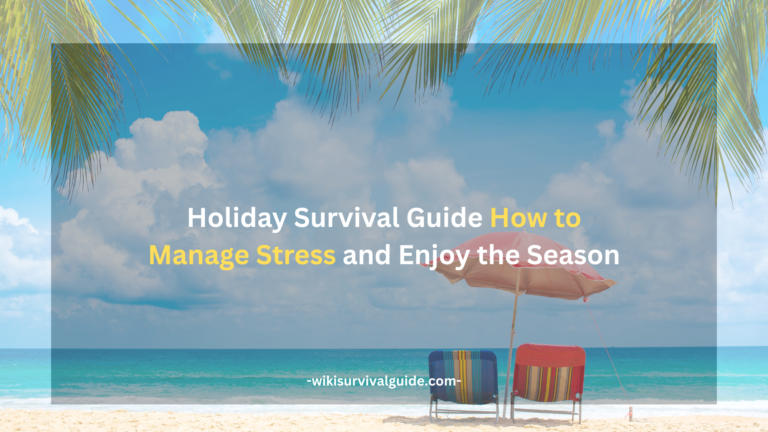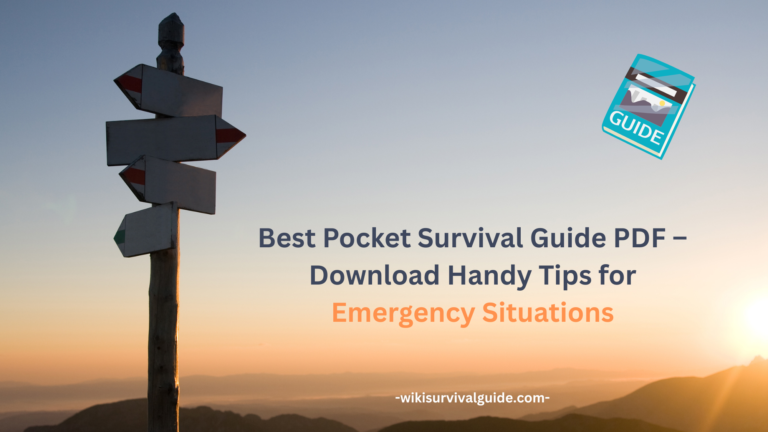Being an empath comes with its unique set of challenges. From feeling overwhelmed by the emotions of others to struggling with boundaries, empaths often find themselves drained and exhausted. The Empath’s Survival Guide by Dr. Judith Orloff provides practical tools to help empaths not only survive but thrive. In this article, we’ll dive into the key takeaways from this guide, offering tips on how to manage emotions, protect your energy, and create healthier relationships.
Understanding Empathy and Being an Empath
Empathy is more than just understanding someone’s emotions—it’s the ability to feel what they’re feeling. For most people, empathy is a valuable social skill. But for empaths, it’s a way of life. An empath doesn’t just recognize emotional energy; they absorb it. This deeply intuitive connection to others can be both a superpower and a challenge.
Being an empath means you often sense the emotions of those around you without words. Crowded spaces, emotional conversations, or even watching the news can feel overwhelming. But it’s not just emotional empathy. Empaths may also be sensitive to sounds, lights, or even the vibes of a room. This heightened sensitivity is part of what sets them apart.
In Judith Orloff’s The Empath’s Survival Guide, she breaks down the different types of empaths, from emotional and physical to intuitive and earth empaths. Each type connects with energy in its own way. While being an empath can feel isolating, understanding your nature is the first step to managing it.
Recognizing this gift helps empaths embrace their sensitivity rather than fight it. Instead of seeing their empathy as a weakness, they can use it to foster deeper connections and make more meaningful contributions to the world.
Challenges Faced by Empaths
Empaths often face unique challenges that others may not understand. Because they absorb emotional energy, they can become drained, anxious, or overwhelmed quickly—especially in emotionally charged environments.
One major struggle is emotional overload. Empaths don’t just witness pain; they feel it. This can make everyday situations, like working in an office or navigating family conflict, exhausting. Without proper boundaries, an empath might constantly take on other people’s stress, sadness, or anger without realizing it.
Another common issue is burnout. Since empaths are natural caretakers, they often put others’ needs before their own. They may feel guilty for saying “no” or stepping away, even when they’re at their limit. Over time, this leads to emotional exhaustion or compassion fatigue.
Relationships also pose a challenge. Empaths can fall into codependent patterns, trying to “fix” others or losing their own identity in the process. They might attract energy vampires—people who unconsciously drain their energy.
Dr. Orloff emphasizes the importance of self-care for empaths. Setting boundaries, practicing alone time, and grounding techniques (like meditation or time in nature) can help protect their energy. Empaths don’t need to change who they are—they just need tools to navigate a world that often feels too loud and too much.
The Role of Emotional Sensitivity in Daily Life
Emotional sensitivity is at the heart of the empath experience. It influences how they make decisions, form relationships, and navigate their daily routines. Unlike others who may process events intellectually, empaths lead with emotion—feeling everything deeply, often to the core.
This sensitivity can be a double-edged sword. On one hand, it makes empaths excellent listeners, caregivers, and friends. They pick up on subtleties that others miss—a slight change in tone, a forced smile, or an unspoken concern. These skills make them intuitive and compassionate.
However, this same trait can be draining. An emotionally sensitive person might ruminate on interactions, worry about others’ problems, or feel responsible for fixing things that aren’t theirs to fix. For example, an empath might replay a minor disagreement all day, feeling hurt and unsure of how to move forward.
The world isn’t always kind to sensitive souls. Society often rewards toughness and emotional control. Empaths may feel out of place in fast-paced, high-pressure environments or be dismissed as “too sensitive.”
Orloff encourages empaths to reframe their sensitivity as a strength, not a flaw. It’s about learning to manage your emotional environment, not shutting down. With tools like mindfulness, deep breathing, and strategic alone time, empaths can protect their energy while still showing up as their fully sensitive selves.
Signs You Might Be an Empath
Not sure if you’re an empath? There are telltale signs that go beyond just “being sensitive.” Empaths feel things deeply—but more importantly, they feel other people’s emotions as if they were their own. This can happen without any verbal communication. You just know when someone’s upset or stressed, even if they haven’t said a word.
You might notice you feel drained after spending time in crowds or high-energy environments. Shopping malls, concerts, or airports may leave you needing a break. Empaths also often need time alone to recharge. Solitude isn’t just a preference—it’s essential for emotional recovery.
Other common signs include:
- Difficulty watching violent or distressing media
- A strong connection to animals or nature
- Being called “too emotional” or “too sensitive” by others
- Absorbing others’ stress, sadness, or joy without meaning to
Empaths also tend to attract people who need emotional support. If you find yourself being the “therapist” in your friend group or constantly helping others through their issues, that’s another clue.
Judith Orloff’s guide includes self-assessments to help you identify your empath traits. Recognizing these signs is empowering—it helps you understand your reactions and develop strategies for protecting your emotional space.
The Impact of Empathy on Relationships
Relationships can be especially intense for empaths. While their emotional attunement makes them deeply loving partners, friends, and family members, it can also lead to imbalance and emotional burnout.
Because empaths feel so deeply, they often prioritize their partner’s emotions over their own. They might bend over backward to keep the peace or avoid conflict to prevent emotional distress. This can result in relationships that feel one-sided, where the empath gives more than they receive.
Empaths are naturally drawn to emotionally complex people. They often believe they can “heal” or “fix” their partners. While this comes from a place of love, it can create codependency or lead to unhealthy dynamics.
Judith Orloff suggests that empaths need partners who respect their sensitivity. Boundaries are crucial. It’s okay to ask for alone time, even in a committed relationship. Communication also plays a key role—empaths must express their needs rather than internalizing everything.
When relationships are balanced, empaths can thrive. Their ability to love unconditionally, listen deeply, and connect authentically makes them incredible companions. But to keep the balance, they must learn to put themselves first sometimes—and that’s not selfish, it’s survival.
Boundaries for Empaths: Why They Matter
For empaths, boundaries are not just helpful—they’re essential. Without them, life can feel like an emotional sponge, soaking up everyone else’s stress, sadness, and tension. Empaths naturally want to help, listen, and care for others. But when those actions come at the expense of their own well-being, burnout isn’t far behind.
Boundaries protect your time, energy, and emotional space. They give you the power to say, “This is where I end and you begin.” That might sound simple, but for many empaths, it’s not easy. Saying no can feel like letting someone down or being unkind. But in truth, boundaries are the most loving thing you can set—for both yourself and others.
Judith Orloff emphasizes that boundaries don’t mean building walls. Instead, they’re like healthy fences with gates that you control. You decide who enters, when, and how long they stay. It might mean limiting time with toxic people, stepping away from draining conversations, or even blocking negative content on social media.
Healthy boundaries help empaths stay grounded, clear, and emotionally available without collapsing under the weight of others’ feelings. It’s about giving from a place of fullness, not depletion.
How to Protect Your Energy as an Empath
Empaths are highly attuned to emotional energy. While that can be a gift, it also leaves them vulnerable to emotional exhaustion. Protecting your energy isn’t about isolating yourself—it’s about becoming aware of what drains you and taking conscious steps to stay balanced.
One key strategy is recognizing your energetic triggers. These can be environments (like loud, crowded spaces), certain people (emotional vampires), or even intense media. Once you identify these triggers, you can create a plan—like limiting exposure, scheduling downtime, or practicing grounding before and after.
Another tactic is visualization. Many empaths benefit from imagining a protective shield—like a bubble of light—around them before entering stressful situations. This simple practice helps you stay centered in your own energy instead of merging with others’.
You can also use physical movement to reset your energy field. A quick walk outside, a few stretches, or even shaking out your hands can help clear emotional residue.
Dr. Orloff encourages empaths to develop daily rituals that restore energy—morning meditations, nature breaks, journaling, or energy-cleansing practices like sage or salt baths.
Protecting your energy isn’t selfish—it’s how you preserve your ability to care deeply without becoming overwhelmed. When your energy is protected, your empathy becomes sustainable and powerful.

Grounding Techniques for Empaths
Grounding is the act of connecting to the present moment and anchoring your energy. For empaths, grounding is a lifeline—it keeps you from floating away in emotional overload or absorbing everyone else’s feelings like a sponge.
A simple but powerful grounding technique is earthing—walking barefoot on grass, dirt, or sand. This direct contact with the earth helps regulate your energy and brings you back to your body. If that’s not possible, even stepping outside and taking a few deep breaths can do wonders.
Another great practice is using sensory focus. Try this: Sit comfortably and name five things you see, four things you feel, three things you hear, two things you smell, and one thing you taste. This exercise engages your senses and grounds you quickly.
Meditation and breathwork are also effective. Focused breathing—like inhaling for four counts, holding for four, and exhaling for four—can calm your nervous system and center your mind.
Carrying grounding tools can help too. Crystals like hematite or black tourmaline, essential oils like vetiver or cedarwood, or even a grounding affirmation like “I am safe and rooted” can create a sense of emotional stability.
Empaths often live in their heads and hearts. Grounding brings them back to their bodies—a vital step for balance and emotional wellness.
Managing Emotional Overload: Practical Tips
Emotional overload is the empath’s kryptonite. When you’re constantly absorbing others’ feelings, even minor stressors can tip you over the edge. That’s why learning to manage emotional overload isn’t just helpful—it’s essential for survival.
First, identify when you’re reaching your limit. Signs include irritability, fatigue, brain fog, or a sense of emotional heaviness that doesn’t belong to you. When that happens, pause. Step away, take a breath, and tune into your own emotions.
One quick fix? Take a sensory break. Go outside, dim the lights, or listen to calming music. Engaging your senses helps reset your emotional state.
Journaling is another great release valve. Pour your thoughts onto paper—don’t judge or edit. Just write. It gives your emotions a place to go rather than bottling them up inside.
Boundaries also play a role. If someone is venting non-stop or emotionally dumping, it’s okay to say, “I care about you, but I need a moment to recharge.” That’s not rejection—it’s self-respect.
Dr. Orloff also suggests regular “emotional detox” days: no drama, no news, just calm. Use those days for nature walks, soothing baths, or quiet creativity. Overload isn’t a badge of honor—it’s a signal that your system needs care.
Self-Care Strategies for Empaths
Self-care isn’t a luxury for empaths—it’s survival. When you absorb emotional energy all day, you need intentional practices to replenish and protect yourself. Think of self-care as your emotional armor and energy reset button.
First, schedule downtime like it’s a doctor’s appointment. Don’t wait until you’re overwhelmed. Quiet alone time helps empaths recharge and reconnect to their own emotional baseline.
Physical self-care matters too. Sleep, hydration, gentle movement (like yoga or walking), and healthy food keep your body strong—which makes your emotional boundaries stronger, too.
Creative outlets can also be a form of emotional release. Drawing, writing, playing music, or crafting give empaths a safe place to express feelings they’ve absorbed.
Spiritual practices are often grounding for empaths. Meditation, prayer, energy work, or simply spending time in nature helps bring clarity and peace. If you’re into crystals, try rose quartz for self-love or amethyst for emotional protection.
Finally, surround yourself with people who respect your boundaries and understand your sensitivity. You don’t have to explain or defend your need for rest, quiet, or space. The right people will support your self-care, not make you feel guilty for it.
As Orloff reminds us, being an empath is a gift—but you have to nurture the giver.
Understanding the Difference Between Empathy and Sympathy
People often confuse empathy with sympathy, but the difference is more than just semantics—it’s a major emotional boundary. Sympathy is feeling for someone. You might say, “I’m sorry you’re going through that.” Empathy, on the other hand, is feeling with someone. You actually absorb their emotions as if they were your own.
For empaths, this distinction is crucial. Sympathy allows space. Empathy immerses. While sympathy offers support from a distance, empathy walks straight into the fire of someone else’s pain.
Dr. Judith Orloff explains that empaths don’t just understand what someone is feeling—they actually feel it. It’s like emotional Wi-Fi; they’re constantly picking up signals from others, often without realizing it.
Recognizing this difference helps empaths navigate relationships better. Instead of getting lost in someone else’s emotional storm, they can choose to offer sympathy when necessary, while protecting their own emotional space.
Learning to shift from empathy to compassionate detachment is powerful. It means you care deeply, but without drowning in someone else’s emotions. You listen, support, and offer kindness—without taking on their burdens as your own.
This understanding is key for emotional health. It lets empaths keep their hearts open while staying grounded and sane.
How to Identify and Avoid Energy Drainers
Energy drainers—also known as emotional vampires—are people or situations that leave you feeling exhausted, anxious, or mentally foggy. For empaths, being around these drainers can feel like walking through an emotional minefield.
So how do you identify one? Start by tuning into your body and mood after an interaction. Do you feel lighter, or heavier? Inspired or depleted? Empaths often sense subtle shifts—tight shoulders, headaches, mood swings—that signal an energy drain.
Common culprits include chronic complainers, drama magnets, manipulators, or people who dominate conversations without reciprocating. Even environments—like a crowded office or noisy cafe—can sap your energy if you’re not careful.
Avoiding energy drainers doesn’t always mean cutting people out (though sometimes it does). It might mean limiting time spent with them, setting firmer boundaries, or mentally preparing before interactions.
Protective visualization helps, too. Imagine a shield of light surrounding you before engaging with a draining person. It may sound woo-woo, but it’s surprisingly effective.
The key is staying aware of how others affect your energy. You can’t always control who you’re around, but you can control how you protect yourself. And for empaths, that’s everything.
Empaths in the Workplace: How to Navigate Stress
The workplace can be tough for empaths. Offices are often filled with unspoken tension, strong personalities, and overstimulation. Add deadlines and expectations to the mix, and it’s a perfect storm for emotional overwhelm.
Empaths may struggle with conflict, feel responsible for others’ moods, or become emotionally drained by endless meetings and noise. But with awareness and tools, work doesn’t have to be a constant energy suck.
First, create a calm zone. If possible, personalize your space with soothing colors, plants, or calming objects. Noise-canceling headphones and calming playlists can also help regulate sensory input.
It’s also vital to take breaks. Even a five-minute walk or a few deep breaths outside can help you reset. Don’t underestimate the power of a “mental sip of water.”
Boundaries matter here too. Avoid office gossip or emotionally charged conversations when you’re already feeling vulnerable. Politely excuse yourself, or change the subject to something neutral.
Communication is key. Let coworkers know (if you’re comfortable) that you’re someone who focuses better in quiet or needs solo time to recharge.
Lastly, make time after work for decompression. Empaths need space to unload the energy they’ve picked up during the day. Whether that’s yoga, journaling, or simply silence, treat it like a necessity—not a luxury.
The Importance of Alone Time for Empaths
Alone time isn’t just relaxing for empaths—it’s non-negotiable. It’s during solitude that empaths can sort through the emotional noise and reconnect with their own energy.
When you spend time alone, you give your nervous system a break. No conversations to process, no moods to absorb—just space to breathe and be. Think of it like emotional housekeeping. Alone time lets you dust off the mental clutter and reset your inner peace.
This doesn’t mean you have to meditate for hours in silence (though that’s great, too). Alone time can look like taking a long walk, reading a book, doing crafts, or simply lying on the couch with music playing. The key is being undisturbed and tuning inward.
Dr. Orloff recommends making alone time a daily ritual—even 15 minutes can make a difference. And if you’re in a relationship or have a busy household, communicate your need for solo space. It’s not about avoiding others; it’s about preserving your emotional wellness.
Alone time is how empaths return to center. It’s where their strength is recharged, their thoughts become clear, and their compassion finds balance.
How to Deal with Emotional Absorption
Emotional absorption is one of the most challenging aspects of being an empath. It’s like being an emotional sponge—soaking up stress, sadness, anxiety, or even excitement from people around you. While this sensitivity is a gift, unchecked absorption can leave you exhausted, overwhelmed, or emotionally confused.
The first step is awareness. Ask yourself: “Is this feeling mine?” You might suddenly feel anxious or sad for no clear reason. Often, it’s because you’ve picked up someone else’s energy without realizing it.
Grounding techniques (like breathwork or walking in nature) can help release this energy. Visualization also works well. Imagine the foreign emotions as smoke being exhaled from your body, or picture yourself wrapped in a protective cloak that only lets in your own feelings.
Another method is a clearing ritual—take a salt bath, light sage or incense, or do some gentle stretching to help move stuck emotions.
Empaths should also avoid constant “emotional merging.” Be present, but maintain a sense of emotional separation. Compassionate detachment is your friend.
Most importantly, give yourself permission to let go. You’re not responsible for fixing everyone. You can care deeply and still protect your own peace. Emotional absorption may be natural, but with the right tools, it doesn’t have to be overwhelming.
Developing Emotional Resilience as an Empath
Emotional resilience isn’t about shutting down or toughening up—it’s about staying open while knowing how to bounce back. For empaths, who often feel everything deeply, building resilience is a form of self-love and survival.
Resilience starts with understanding your own limits. Know when to say “no,” when to step back, and when to rest. It’s okay not to attend every gathering or answer every emotional SOS.
Next, anchor yourself in routines that ground you—morning quiet time, a journaling habit, regular exercise, or even sipping tea in silence. These small, mindful practices help you stay centered when life throws curveballs.
Mindfulness and breathwork are powerful tools for staying calm in chaos. When emotions surge—yours or others’—take a few deep breaths and mentally step back. A moment of pause can prevent emotional overwhelm.
You also need to reframe how you see your sensitivity. It’s not weakness—it’s your superpower. But like any power, it needs direction and care.
Finally, speak kindly to yourself. Empaths often internalize criticism and guilt. Replace that self-talk with compassion. Tell yourself: “I’m allowed to feel. I’m allowed to rest. I’m allowed to protect my energy.”
Resilience is your emotional armor. Not to block feelings—but to process them, recover, and thrive.
Empathy vs. Empath: Understanding the Distinction
Empathy is a human ability—being able to understand and share someone else’s feelings. Most people have empathy. But being an empath is something deeper and more intense.
An empath doesn’t just “get” how someone feels—they actually absorb that feeling as their own. If a friend is anxious, the empath may start feeling anxious too, without realizing why.
It’s like the difference between watching rain fall and standing in the middle of a thunderstorm. One is observation, the other is immersion.
Understanding this distinction helps empaths better navigate their experiences. It explains why they may suddenly feel drained after a conversation, or why certain places feel “too loud” emotionally. It’s not just empathy—it’s energetic sensitivity.
Not every empathetic person is an empath. And not every empath knows they are one. But recognizing this trait opens the door to better self-care, clearer boundaries, and stronger emotional health.
It also helps others understand you. You’re not “too sensitive” or “overreacting.” You’re just wired to feel more—and deeper.
Embracing the empath identity allows you to channel your gift instead of being overwhelmed by it. Once you understand the difference, you can begin to truly protect and nurture your emotional world.
How Empaths Can Use Their Gifts for Good
Being an empath is a gift—but like any gift, it’s most powerful when used consciously. When you learn to manage your sensitivity, you can become a source of healing and light in the world.
Empaths make incredible listeners. You sense what others don’t say and often know just what to say to comfort someone. Use that skill to support friends, mentor others, or simply be the person who truly gets people.
Your intuition is another strength. Trust those gut feelings—they’re your inner compass. Whether in relationships, decision-making, or creative pursuits, your instincts are often spot-on.
Empaths also have a deep connection to nature and animals. Volunteering, gardening, or spending time with animals can bring joy and calm while contributing to a greater cause.
Art and storytelling are also beautiful outlets. Channel what you feel into writing, painting, music, or dance. Empaths have the ability to create work that truly moves people.
Most importantly, shine your light without dimming it to fit the world’s mold. Share your perspective. Speak your truth. Be the safe space others seek—but make sure you hold that space for yourself, too.
When balanced and protected, an empath can be a powerful force for good—leading with heart, healing with presence.
The Importance of Support Systems for Empaths
Even the most self-aware empath needs support. In fact, having a reliable support system is essential for emotional health and balance.
Why? Because constantly absorbing emotions can be isolating. It’s easy to feel like no one else understands what you’re going through. That’s why you need your people—those who get you, support you, and remind you to take care of yourself.
Support systems come in many forms: a trusted friend who listens without judgment, a therapist who helps you unpack what you’re feeling, or an online group where fellow empaths share their experiences.
You might also benefit from spiritual communities, yoga groups, or mindfulness circles. These spaces tend to attract kindred spirits and create a calm, nurturing vibe.
The key is connection. A strong support system doesn’t just offer comfort—it provides perspective. Others can help you see when you’re taking on too much or remind you it’s okay to rest.
And remember, asking for support isn’t weakness—it’s wisdom. Empaths give so much. It’s only fair (and necessary) that they receive in return.
You’re not meant to carry it all alone. Surround yourself with people who refill your cup, not just drain it.
Living a Balanced Life as an Empath
Balance is the golden ticket for empaths. Without it, life can feel like an emotional rollercoaster. But with the right practices, living in balance is not only possible—it’s powerful.
Balance starts with boundaries. Learn to say “no” when your tank is empty. Recognize when you’re giving too much or stretching yourself thin. Remember: your peace matters as much as anyone else’s comfort.
Next, schedule time for yourself. Treat self-care as a priority, not an afterthought. Even 10 minutes a day to sit quietly or reconnect with nature can restore your energy and sanity.
Mind-body practices like yoga, breathwork, and meditation help regulate your nervous system. They bring you back to your own center—especially after absorbing emotional noise from others.
Surround yourself with positive influences. Whether it’s calming music, inspirational books, or uplifting friends, be intentional about what (and who) you allow into your world.
And don’t forget joy. Dance. Laugh. Get silly. Being an empath doesn’t mean carrying the world’s sadness—it means feeling it all. So embrace the light, too.
Living a balanced life as an empath is about harmony, not perfection. It’s knowing when to connect, when to pull back, and always listening to the rhythm of your own soul.
Conclusion
The Empath’s Survival Guide is a valuable resource for anyone who identifies as an empath. Dr. Orloff’s practical advice helps empaths understand their emotions, set boundaries, and embrace their gifts without feeling overwhelmed. By implementing the strategies outlined in this guide, empaths can live more balanced, fulfilled lives while still caring for others. Remember, it’s okay to prioritize your own well-being and protect your energy.
FAQs
What is the main takeaway from The Empath’s Survival Guide?
The main takeaway is learning how to protect your energy, set boundaries, and manage overwhelming emotions to thrive as an empath.
Can empaths be happy in relationships?
Yes, by setting boundaries, practicing self-care, and open communication, empaths can have happy relationships.
How do I protect my energy as an empath?
Use grounding techniques, set boundaries, and engage in regular self-care to protect your energy.
What should an empath do when overwhelmed by emotions?
Take a break, practice deep breathing or meditation, and determine if the emotions are yours or from others.
Can empaths work in high-stress environments?
Yes, but they must manage their energy, set boundaries, and take regular breaks to avoid burnout.




Leave a Comment